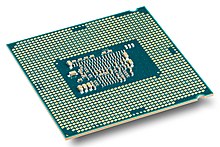
Back Kaby Lake Catalan Kaby Lake Czech Intel-Kaby-Lake-Mikroarchitektur German Kaby Lake Spanish کبی لیک Persian Intel Kaby Lake Finnish Kaby Lake French Kaby Lake Armenian Kaby Lake Italian Kaby Lakeマイクロアーキテクチャ Japanese
 Intel Celeron G3930 | |
| General information | |
|---|---|
| Launched | August 30, 2016 |
| Discontinued | October 9, 2020 (desktop processors)[1] |
| CPUID code | 0806e9h, 0806eah, 0906e9h |
| Product code | 80677 |
| Performance | |
| Max. CPU clock rate | 1.00 GHz to 4.5 GHz |
| Cache | |
| L1 cache | 64 KB[a] per core (32 KB instructions + 32 KB data) |
| L2 cache | 256 KB per core |
| L3 cache | Up to 8 MB, share |
| L4 cache | 64 MB of eDRAM (on models with Iris Plus graphics) |
| Architecture and classification | |
| Technology node | Intel 14FF+ |
| Microarchitecture | Skylake |
| Instruction set | x86-64 |
| Instructions | x86-64 |
| Extensions | |
| Physical specifications | |
| Cores |
|
| Socket | |
| Products, models, variants | |
| Product code name |
|
| Brand name |
|
| History | |
| Predecessor | Skylake |
| Successors |
|
| Support status | |
| Legacy support for iGPU | |
Kaby Lake is Intel's codename for its seventh generation Core microprocessor family announced on August 30, 2016.[7] Like the preceding Skylake, Kaby Lake is produced using a 14 nanometer manufacturing process technology.[8] Breaking with Intel's previous "tick–tock" manufacturing and design model, Kaby Lake represents the optimized step of the newer process–architecture–optimization model.[9] Kaby Lake began shipping to manufacturers and OEMs in the second quarter of 2016,[10][11] with its desktop chips officially launched in January 2017.
In August 2017, Intel announced Kaby Lake Refresh (Kaby Lake R) marketed as the 8th generation mobile CPUs, breaking the long cycle where architectures matched the corresponding generations of CPUs and meanwhile also supporting Windows 11.[12][13] Skylake was anticipated to be succeeded by the 10 nanometer Cannon Lake, but it was announced in July 2015 that Cannon Lake had been delayed until the second half of 2017.[14][15] In the meantime, Intel released a fourth 14 nm generation on October 5, 2017, named Coffee Lake. Cannon Lake would ultimately emerge in 2018, but only a single mobile CPU was released before it was discontinued the following year.[16][17]
- ^ Shilov, Anton (October 10, 2019). "Intel To Discontinue Nearly All Desktop Kaby Lake CPUs". AnandTech.com. Retrieved July 29, 2020.
- ^ "Intel Core i7-7660U specifications". Retrieved February 18, 2017.
- ^ "Intel Core i7-7920HQ specifications". Retrieved February 18, 2017.
- ^ "Intel Core i5-7Y57 specifications". Retrieved February 18, 2017.
- ^ Cutress, Ian (August 15, 2017). "Intel Officially Reveals Post-8th Generation Core Architecture Code Name: Ice Lake, Built on 10nm+". AnandTech. Retrieved April 7, 2023.
- ^ Bright, Peter (August 15, 2017). "Intel's next generation chip plans: Ice Lake and a slow 10nm transition". Ars Technica. Retrieved August 15, 2017.
- ^ Cite error: The named reference
:0was invoked but never defined (see the help page). - ^ Smith, Ryan; Howse, Brett (July 16, 2015). "Tick Tock on the Rocks: Intel Delays 10nm, Adds 3rd Gen 14nm Core Product "Kaby Lake"". AnandTech. Retrieved December 6, 2016.
- ^ Cutress, Ian (March 22, 2016). "Intel's 'Tick–Tock' Seemingly Dead, becomes 'Process–Architecture–Optimization'". AnandTech. Retrieved December 6, 2016.
- ^ Howse, Brett (July 20, 2016). "Intel Begins Shipment of Seventh Generation Core: Kaby Lake". Anandtech. Retrieved July 27, 2016.
- ^ Kampman, Jeff (July 21, 2016). "Intel begins shipping Kaby Lake CPUs to manufacturers". Tech Report. Retrieved July 27, 2016.
- ^ Cutress, Ian (August 21, 2017). "Intel Launches 8th Generation Core CPUs, Starting with Kaby Lake Refresh for 15W Mobile". AnandTech. Retrieved August 22, 2017.
- ^ Shrout, Ryan (August 21, 2017). "Intel announces 8th Generation Core Processors, starting with 15-watt quad-core Kaby Lake refresh for notebooks". PC Perspective. Archived from the original on August 6, 2018. Retrieved August 22, 2017.
- ^ Bright, Peter (July 15, 2015). "Intel confirms tick-tock-shattering Kaby Lake processor as Moore's Law falters". Ars Technica. Retrieved July 27, 2016.
- ^ Hruska, Joel (July 16, 2015). "Intel confirms 10nm delayed to 2017, will introduce 'Kaby Lake' at 14nm to fill gap". ExtremeTech. Retrieved July 27, 2016.
- ^ Liu, Zhiye (October 31, 2019). "Intel discontinues Cannon Lake NUC". Tom's Hardware. Retrieved November 11, 2019.
- ^ Herzig, Benjamin (May 13, 2018). "Cannon Lake stumbles into the market: The IdeaPad 330-15ICN is the first laptop with a 10-nm-CPU". NotebookCheck. Retrieved May 14, 2018.
Cite error: There are <ref group=lower-alpha> tags or {{efn}} templates on this page, but the references will not show without a {{reflist|group=lower-alpha}} template or {{notelist}} template (see the help page).